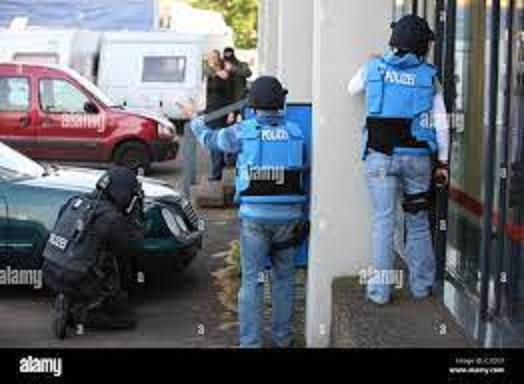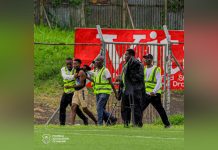Africa-Press – Mauritius. Two incidents that have hit the headlines in recent weeks highlight the issue of law and order and security in Mauritius. One is the accident in which a police vehicle suddenly pulled out of its way and crashed into a gas station, killing one gas station attendant and seriously injuring another in the process.
The other is police intervention in a distressed family that led to the death of a man, apparently shot to prevent him from assaulting his wife and toddler.
These two incidents may not be related to each other, but they have as a common denominator the behavior of the police in emergency situations. They should be situated against the backdrop of widespread insecurity that appears to be taking hold in the country for a multitude of reasons.
No one can deny that common law crime has taken an upward curve under the facade of consumer society which gives Mauritians the illusion of social progress.
No day goes by without the press reporting a murder (with or without premeditation), a suspicious disappearance, rape or other form of sexual assault, a homicidal car accident, an armed robbery or a break and enter.
, a child kidnapping or a scene of domestic violence. Given the high frequency of criminal acts, there is a tendency to trivialize things by treating them all as news items.
However, behind the veneer of modernity in which the country is painted, there are obvious signs of a social unrest characterized by various forms of violence, some more horrendous than the others.
Widespread insecurity When economic modernism is accompanied by a regression of mores, encouraged by the loss of moral benchmarks, there is a dysfunction in society.
Security therefore becomes a major societal issue, both on the public and on the private level. On the public level, there is a general feeling of insecurity with violent crime and the aftermath of organized crime (drug trafficking). The administration of public order has shown undeniable flaws for some time.
One has the impression that the police are overwhelmed by events due to a misallocation of resources to the various positions of responsibility (for example, the significant number of police officers assigned to the guard of political figures or to the surveillance of intersections on the light rail route as opposed to other public order priorities), a lack of training to deal with the risks of violence and political interventionism in certain areas of police administration.
The first incident (police car accident causing death of a man) raises the question of the professional behavior of the police officers involved in a situation which she initiated.
As this incident is under investigation, one should avoid guesswork and jump to conclusions. However, people with a sense of justice are curiously asking themselves two questions as they await the results of the investigation.
First, are the police above the law or are they subject to the same laws as everyone else?
Second, can the police themselves investigate themselves when they are involved in a fatal incident where they are directly responsible?
In many countries, a special investigations unit under the justice ministry investigates such an incident with a view to dispelling any perception that the police are judge and party at the same time.
On the private level, Mauritians have developed a mentality, even an obsession with security, in order to protect themselves from attacks or attacks on the person.
A growing number of them live in houses monitored by 24/7 cameras inside courtyards fenced by perimeter walls topped with rows of barbed wire. It feels like a military zone in some neighborhoods.
When people are in trouble, they call the police for help. Thus, acts of domestic or conjugal violence give rise to the intervention of the police when an alleged victim wants to escape an assault.
The second homicide incident raises questions about the professional behavior of the police in an emergency where they are called upon to save threatened lives. Police responsibilities
To shed more light on the responsibilities of the police in such a situation, we will cite the book ‘Sociology in Our Times’ (3rd edition by Diana Kendall, Jane L.
Murray and Rick Lenden) in chapter 7 “Crime and Violence” . The authors define two dimensions of the role of the police: (1) the police have the authority and sometimes the duty to intervene in situations where something must be done immediately; and
(2) the authority of the police is based on a non-negotiable force. If someone refuses to comply with an order, the police can use force (normally arrest) to support their request.
This quote from Egon Bittner in the book is relevant: “What policemen do appears to consist of rushing to the scene of any crisis whatever, judging its needs in accordance with canons of common sense reasoning, and imposing solutions upon it without regard to resistance or opposition.
” (1980: 137). The two incidents elicited opposite reactions from the public.
In the first case, there was a misunderstanding, even a disapproval of the way in which the police officers behaved. We talked about non-assistance to a person in danger.
In the second case, there was an understanding, even approval, of how a police officer behaved to incapacitate an aggressive man. This apparent contradiction exposes the complexity of the notion of justice, which is a relative notion, not an absolute one.
Everyone exercises their sense of justice according to their knowledge of the applicable law or according to their moral values. Human rights activists will argue that the police do not have the right to kill a person, whether intentionally or unintentionally.
For them, the right to life is sacred and no one can take it away from anyone for any reason. Moreover, in the name of this humanism, they contest any proposal to restore the death penalty, even in the event that a repeat criminal posing a danger to other people is found guilty of an unequivocal crime (beyond reasonable doubt).
They will invoke the international convention against the death penalty to which countries are signatories to justify their own moral standards. Balance of rights
Unlike these libertarian humanists, there are no less humanistic people who believe that certain horrific crimes such as the premeditated murder or the rape of a minor child carry the death penalty.
They believe that some repeat criminals are incapable of social rehabilitation and must be eliminated forever in order to save the state the costs of their incarceration.
Morally, the rights of criminals (defense, fair trial, physical protection of the person) are no more important than the rights of victims. In recent times, it seems that the pendulum of justice has tipped in the side of suspected criminals, leaving the victims to their doom.
In some cases, magistrates impose ridiculous sentences, so much so that the Director of Public Prosecutions (DPP) sometimes has to appeal these decisions.
In other cases, some prosecuted and sentenced criminals are lucky enough to be pardoned by the pardon committee (we hope, for arguable reasons). In the face of the onslaught of crime, it is more than ever necessary to strengthen the repressive arsenal against violent crime.
This starts with the introduction of minimum sentences in criminal law to remove the discretion of magistrates to decide sentences as they wish. Then, the functioning of the pardon board should be reviewed so that it does not overturn the decisions of the Court without any justification.
The independence of the police should also be ensured so that they can be transparent about their actions. In our rule of law, it is essential to ensure a fair balance between the rights of alleged perpetrators and the rights of victims for natural justice to triumph.
For More News And Analysis About Mauritius Follow Africa-Press







